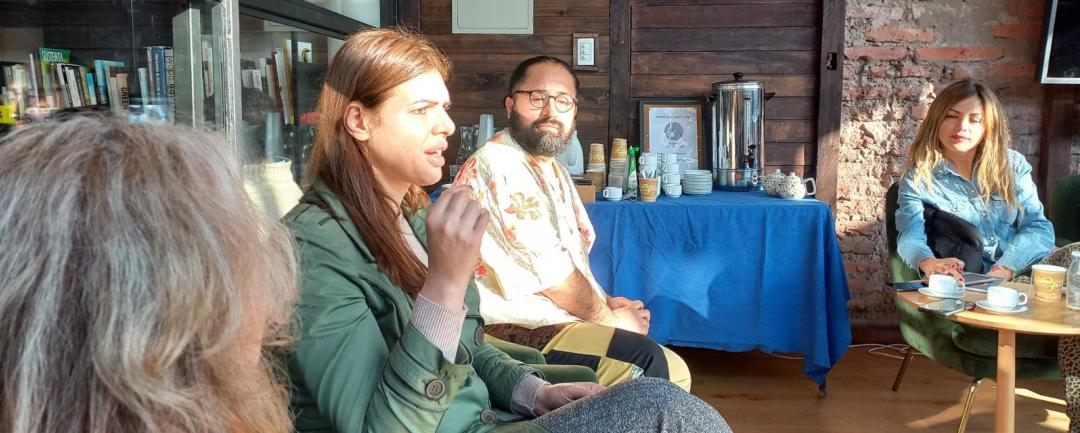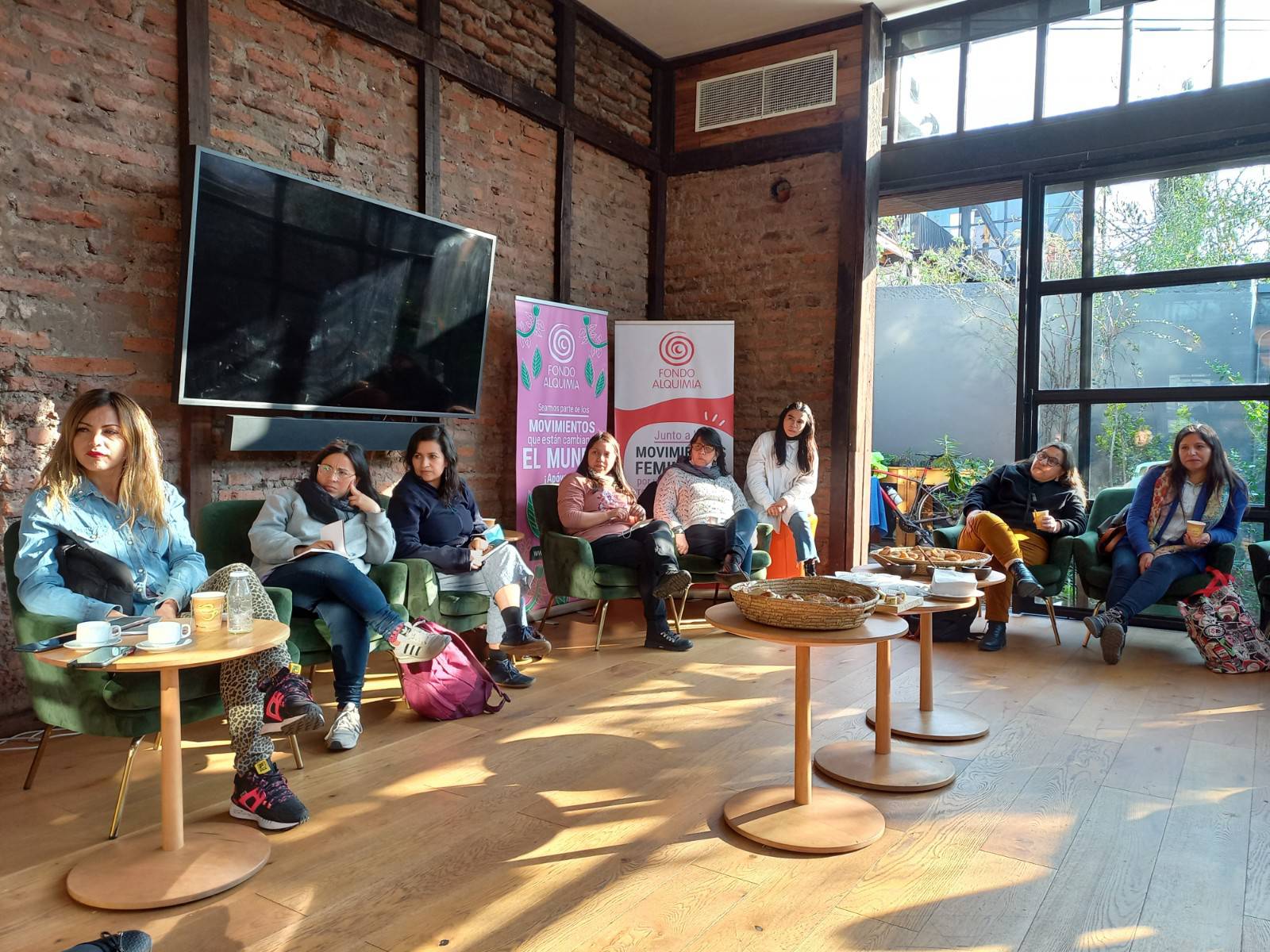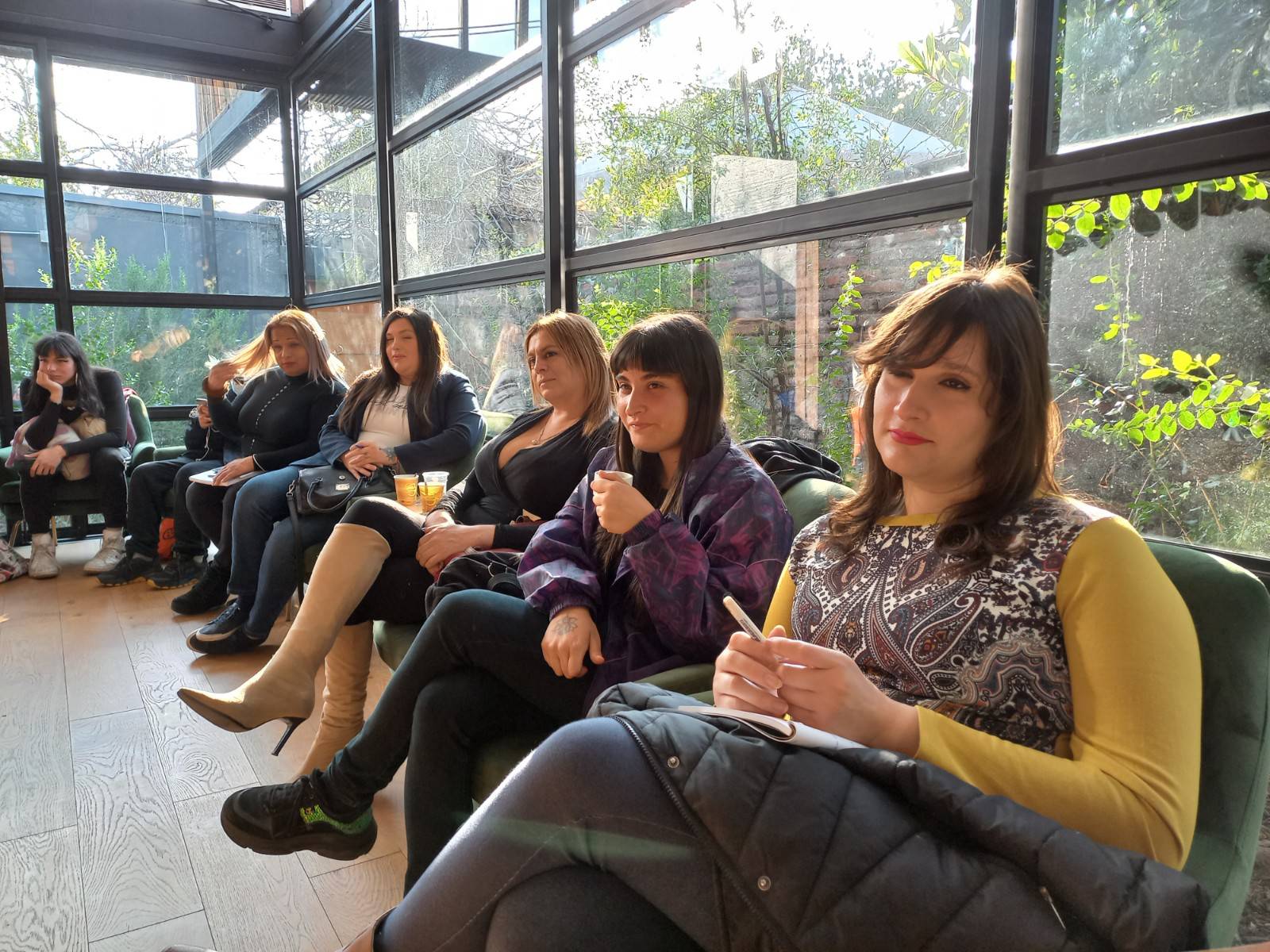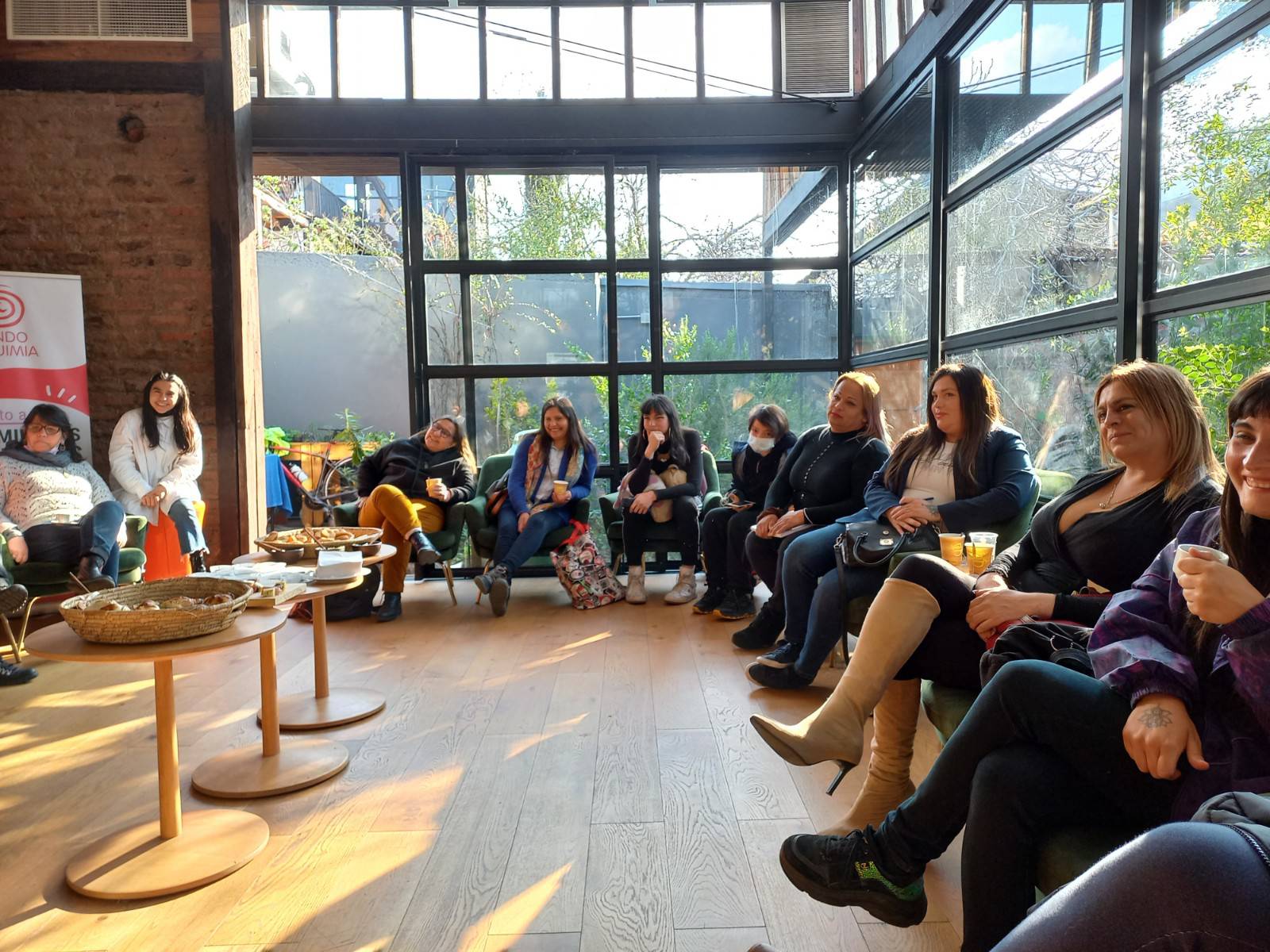
It was 4 pm on September 7 when Walleria Suri made her way into a meeting room in Santiago. Trans woman, visually impaired, human rights activist, Brazilian, consultant and law student. She sat down among about twenty trans, lesbian and feminist activists and opened a dialogue that made it possible to problematize the intersection between trans, disability activism and political advocacy.
It all started with a round of introductions. Walleria asked the attendees to say what they were like, how they dressed, in addition to their name and organization. Diversity immediately emanated: people from the countryside and the city, young and old, fat and thin, hair of different colors, many women, many trans, also lesbians and bisexuals and clothes in the whole range of the rainbow. Soft voices, hoarse voices, Chileans, migrants, lawyers, sex workers, photographers: all activists.
In this multiplicity, Walleria spoke about his history, which is also a bit of the recent history of Brazil. He talked about his childhood and how at the age of 16, retinitis pigmentosa caused him to lose his vision. She said that she always knew she was trans and that when she became blind, she kept wondering how she was going to live facing two realities that cause exclusion.
Uniting two realities
Before beginning her physical transition process, Walleria took her first steps in her gender expression. The first time she went out fully dressed as a woman, she walked through her neighborhood with her cane for support. «People on the street, those who are prejudiced, murmured perplexed, as if wondering: 'What do I do? I hit the gay? or Shall I protect the blind?'”.
“Disabled people are seen as people without gender and without sexuality. That's why when a disabled person presents themselves with a trans identity, that confuses society a lot. Because at the same time that you are seen as very innocent, without malice for being disabled, and on the other hand, trans people are hypersexualized, as people who only think about sex. It is difficult to reconcile these two things. For example, when you enter a dating app at first everything is fine, everything is very normal and polite. But when I say that I am a trans woman, everything changes there and immediately becomes something like "What sexual position do you have?" or "My member is very big." That kind of things. On the other hand, if I'm in a bar talking and a man comes to talk to me, he says "Hi, you're pretty." And he sees my cane and apologizes saying he didn't know I was disabled. The difference is that on the one hand, everyone believes that we are hypersexualized, on the other hand, they think that some are like all immaculate innocent. It's hard to balance all of that. They are like two universes,” explains Walleria.
Following the same line, Walleria explained how experiencing both realities in her body has made her see the prejudices that exist against each community and also within them. “What you end up doing is trying to unite those two communities. Because it is true that they are very different, but very similar: they are highly excluded groups, without access to work, without much education or health due to social exclusion. And they cannot be mutually exclusive. The discussion is the same: the problem is the exclusion of what is different».


industrial silicone
Years before these reflections, Walleria Suri began her transition process in the Brazilian public health system, which has a free service with universal access for cases like hers. “One enters, an evaluation is done by a psychologist, after a year and if everything goes well, he authorizes you to take hormones. There one goes to the endocrinologist and continues with a psychologist until she is two years old. If after a year with hormones, everything goes well, they authorize you to have surgeries: breast, throat and genital. They are all free within the framework of this public service,” Walleria explained, while noting that the wait to access this service can be up to 15 years in some cases.
In Brazil, this program has been in force since 2008 and was created thanks to trans colleagues who demanded equal rights for all people, as established in the Brazilian constitution, which states that all are equal in law, without discrimination. Added to this, at the beginning of the 2000s, many surgeries performed in clandestine clinics and cases of violence and medical negligence began to be seen that needed to be treated by the health system. “There it was understood that the cost of treating the consequences of these irregular procedures was much higher. It is more a matter of the economic order, the cost of making the transition accompanied by a doctor is lower, than after the person did an inadequate hormonal treatment, used industrial silicone and then you have to treat those problems, those consequences”, says Waleria.
This reflection on transit within the framework of public health, put on the table the health problems that colleagues currently face, such as unaccompanied hormonalization and particularly, the use of industrial silicone.
«Of the trans compañeras from Chile, almost all of us began our process in the 1990s and thus, on the recommendations of friends and with hormonal treatments without accompaniment. Today there has been progress in that, in some hospitals you can access it, but there are few and there is also a long waiting list”, points out a trans colleague.
“Also, the problem is that there aren't many doctors specialized in that. And the problem with industrial silicone is that it adheres to the body very deeply. Many times people arrive in an advanced state and cannot be helped, because there is no interest, we are not a respected population”, opines another. "Since there is not much specialization here, many colleagues with serious injuries from silicone end up having to lend themselves to be guinea pigs," he adds.
“A little while ago we had a bingo, supporting a colleague, who had a forado more or less like this… it was bad. I did not see her that day, but I have seen those photos, before the treatment, I do not know how she was completely healed, but she had gone down, she is better. At the hospital of the University of Chile they gave her a treatment and she went home with a machine that helped her clean and how to regenerate that part of the popín, the poto that we call it here in Chile. But that has a high cost, too high for a trans person who also cannot work and who is more or less old. Thanks to the compañeras, to the community, she was able to make money, which was not the total, but she was able to pay for her little machine”, says a transgender woman who is a sex worker.
“Here we do not have explicit regulations for our community. The few things that we have often depend on the will of health professionals and not directly from the State. No resources are allocated to serve us. We are in a kind of orphanage with respect to the State”, argues a transgender woman lawyer.
"The State is equally responsible for the girl having put on industrial silicone, if it was the State that systematically denied the existence of old transvestites," says a trans woman sex worker.
"We have colleagues who are dying from silicone, others who have died," says one. «It is important that among ourselves we educate the generations that come so that this ends. We have to cut the thread so that in the future there are no trans girls with industrial silicone. That problem is going to end if we ourselves help it to end. Even if it's denouncing the people who do it. We have to educate ourselves so that this does not continue, “adds another.

Structural violence and living in constant danger
After completing her transition process at the age of 34, Walleria Suri gradually met trans women, consolidated her own identity and participated until she became an activist. Today he is part of the Municipal Councils for Cultural Policy and Health of the city of Presidente Prudente, in Brazil and a member of the organization that fights for people with visual disabilities, Grupo OLLA. From that experience and surrounded by Chilean activists. Walleria Suri reflected on the human rights of trans people:
«Our society is very macho, also with cis women. More when there is violence against trans women, the police rarely investigate. Do not care. Society does not care about the lives of trans women. The murder complaints are not identified as transphobic crimes, nothing is said, the public power is unable to count our cases, because they do not know the size of the violence that our community is experiencing. That is why activism is so important, acting so as not to make all the violence that happens invisible. And there is a very big commitment there because we are ourselves counting our deaths, and knowing that later it can be me ”.
Things like these have made Brazil one of the most dangerous countries in the world for trans people. Today it is the country where the most trans women die and at the same time and paradoxically, it is the country that consumes the most pornography with trans women.
"At the same time that they kill, they also want to satisfy themselves sexually. It's as if killing trans women is a way of killing the very desire within them. For all these reasons, life expectancy is 35 years. Many women will never be able to achieve surgery, if they have to wait 15 years and they will barely live -on average- until 35”, says Walleria.
“Here in Chile we also suffered attacks. We are street sex workers and we experience attacks by the same clients. As you well say, they attack us when we get into the car, they assault us, rob us, beat us... those of us who work in Vespucci or in the center are at the mercy of death. I say: we transvestite sex workers have one foot inside the box and the other outside, because we don't know if we're going to get home. Listening to you, I feel that it is the same in Brazil”, says a trans sex worker activist.
«Here there have been many transody attacks and the girls have gone to denounce and the police laugh, they do not make the complaint. Then in the emergency the doctors and nurses do not want to heal our wounds because we are transvestites, because we have a man's name or because we are not the people they want us to be in this system. I have industrial silicone in my body. I became a transvestite at the age of 15 and in the nineties that was the cheapest and fastest method to feminize your body. We wanted to have more feminine hips so that men would like us but also to work on the street and above all so that the police do not hit us or kill us, "says another.
Building Trans Activism
It was not long before 6 in the afternoon when an activist reflected: "What Walleria does is carry out a double fight." They all agree and comment on how important it is to unite the different areas, as if they were variables of the same exclusion. Walleria's activism and her reflections bring to mind more cases like hers.
“We have a trans partner, a sex worker who also lost her vision. That night we were working at Américo Vespucio and a car arrived that attacked all of us. Isidora received the impacts of the pellets in the eyes. She is no longer a sex worker, but continues to be an activist. What I most admire about her is that, that she continues and her strength. We as transvestites are in the last link, marginalized and even more so now having a disability and continuing to fight... for me that is a source of pride. All my admiration for Isidora and for Walleria, "says a colleague.
Life stories like Walleria's and Isidora's problematize the scope of activist struggles. They open the horizons of identities and the urgency to continue building together, to talk as an action that allows us to accompany each other and to unite our work with actions that transform the world. Extend our voices that run through the territories to change the culture and the whole life in a commitment with our future.
There the words multiplied in thanks and mutual hugs and in the warmth of the words and gestures trans activism continued to be built.






